Organizational Behavior 10: Power in the Workplace Case Study
VerifiedAdded on 2021/06/17
|10
|2516
|34
Case Study
AI Summary
This case study explores organizational behavior through the lens of power dynamics in the workplace. It presents the story of Henry, a recent graduate who joins a new firm and observes the various forms of power in action, including legitimate, reward, expert, referent, and coercive power. The case study analyzes Henry's experiences, focusing on his interactions with his supervisor and colleagues, and how these interactions are shaped by the different types of power. It delves into why Henry struggled to approach his supervisor and how power influences employee performance and relationships. The study also provides references to relevant research on power, leadership, and organizational behavior, and answers questions about the case study, explaining the impact of power on employee behavior and organizational performance. This assignment helps students understand the practical implications of power dynamics in a professional setting.
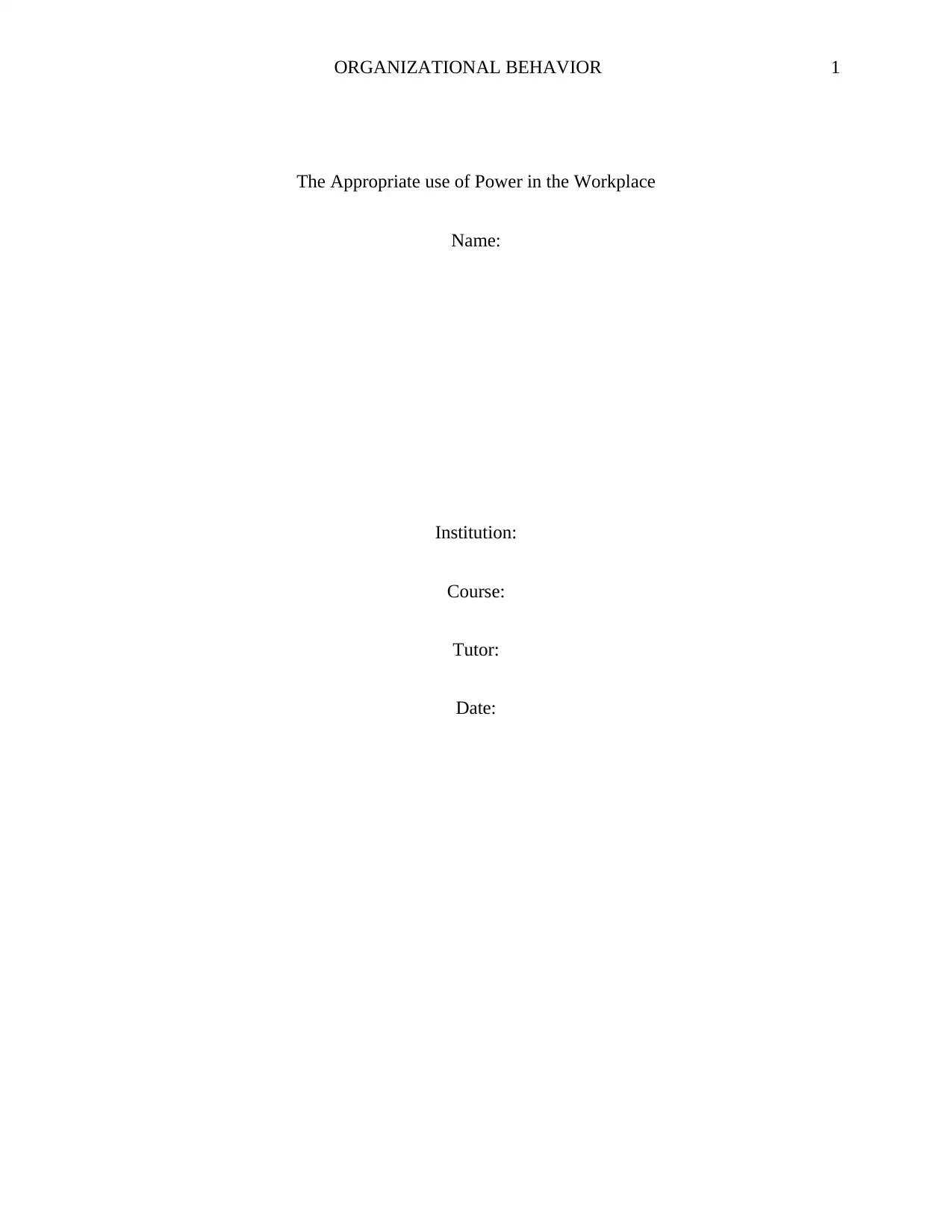
ORGANIZATIONAL BEHAVIOR 1
The Appropriate use of Power in the Workplace
Name:
Institution:
Course:
Tutor:
Date:
The Appropriate use of Power in the Workplace
Name:
Institution:
Course:
Tutor:
Date:
Paraphrase This Document
Need a fresh take? Get an instant paraphrase of this document with our AI Paraphraser
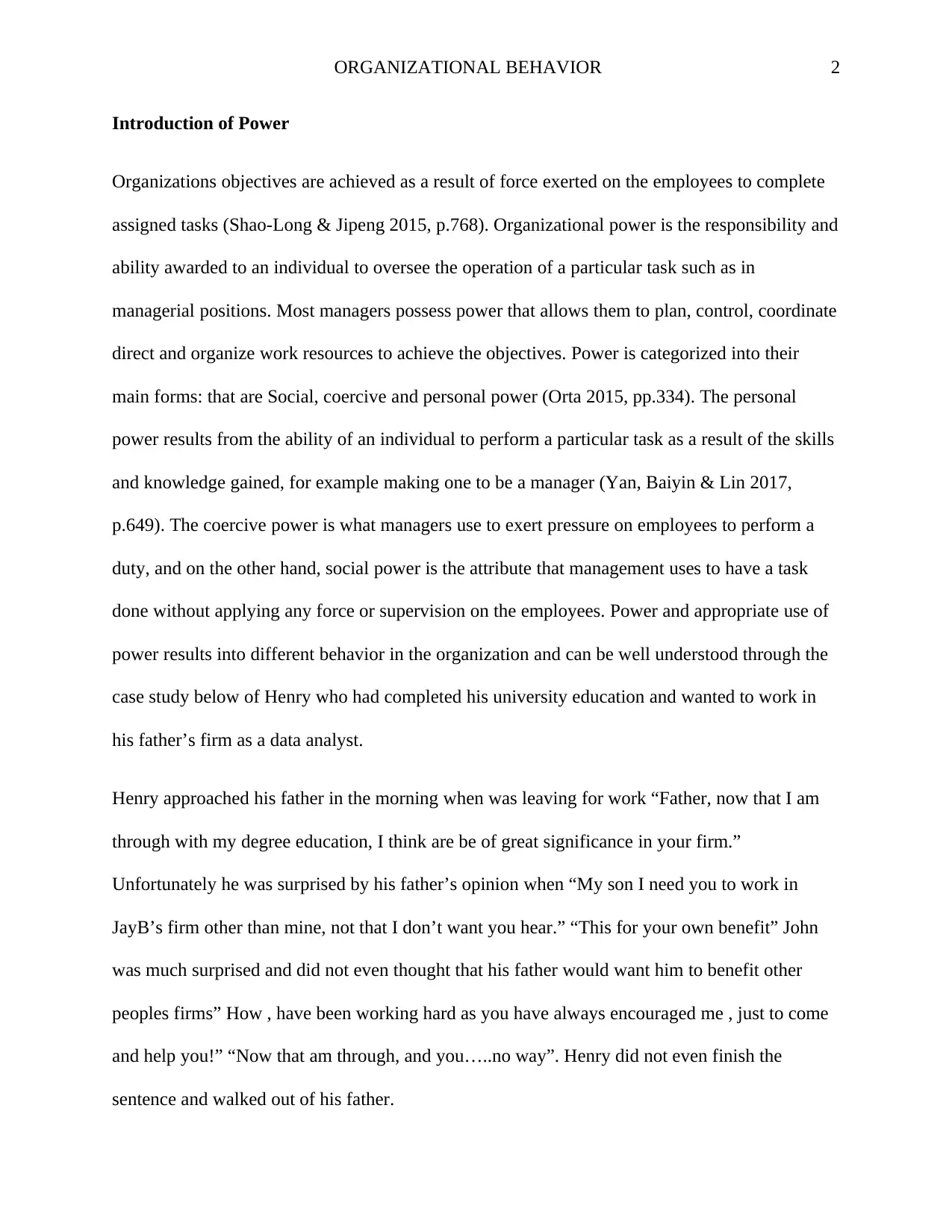
ORGANIZATIONAL BEHAVIOR 2
Introduction of Power
Organizations objectives are achieved as a result of force exerted on the employees to complete
assigned tasks (Shao-Long & Jipeng 2015, p.768). Organizational power is the responsibility and
ability awarded to an individual to oversee the operation of a particular task such as in
managerial positions. Most managers possess power that allows them to plan, control, coordinate
direct and organize work resources to achieve the objectives. Power is categorized into their
main forms: that are Social, coercive and personal power (Orta 2015, pp.334). The personal
power results from the ability of an individual to perform a particular task as a result of the skills
and knowledge gained, for example making one to be a manager (Yan, Baiyin & Lin 2017,
p.649). The coercive power is what managers use to exert pressure on employees to perform a
duty, and on the other hand, social power is the attribute that management uses to have a task
done without applying any force or supervision on the employees. Power and appropriate use of
power results into different behavior in the organization and can be well understood through the
case study below of Henry who had completed his university education and wanted to work in
his father’s firm as a data analyst.
Henry approached his father in the morning when was leaving for work “Father, now that I am
through with my degree education, I think are be of great significance in your firm.”
Unfortunately he was surprised by his father’s opinion when “My son I need you to work in
JayB’s firm other than mine, not that I don’t want you hear.” “This for your own benefit” John
was much surprised and did not even thought that his father would want him to benefit other
peoples firms” How , have been working hard as you have always encouraged me , just to come
and help you!” “Now that am through, and you…..no way”. Henry did not even finish the
sentence and walked out of his father.
Introduction of Power
Organizations objectives are achieved as a result of force exerted on the employees to complete
assigned tasks (Shao-Long & Jipeng 2015, p.768). Organizational power is the responsibility and
ability awarded to an individual to oversee the operation of a particular task such as in
managerial positions. Most managers possess power that allows them to plan, control, coordinate
direct and organize work resources to achieve the objectives. Power is categorized into their
main forms: that are Social, coercive and personal power (Orta 2015, pp.334). The personal
power results from the ability of an individual to perform a particular task as a result of the skills
and knowledge gained, for example making one to be a manager (Yan, Baiyin & Lin 2017,
p.649). The coercive power is what managers use to exert pressure on employees to perform a
duty, and on the other hand, social power is the attribute that management uses to have a task
done without applying any force or supervision on the employees. Power and appropriate use of
power results into different behavior in the organization and can be well understood through the
case study below of Henry who had completed his university education and wanted to work in
his father’s firm as a data analyst.
Henry approached his father in the morning when was leaving for work “Father, now that I am
through with my degree education, I think are be of great significance in your firm.”
Unfortunately he was surprised by his father’s opinion when “My son I need you to work in
JayB’s firm other than mine, not that I don’t want you hear.” “This for your own benefit” John
was much surprised and did not even thought that his father would want him to benefit other
peoples firms” How , have been working hard as you have always encouraged me , just to come
and help you!” “Now that am through, and you…..no way”. Henry did not even finish the
sentence and walked out of his father.
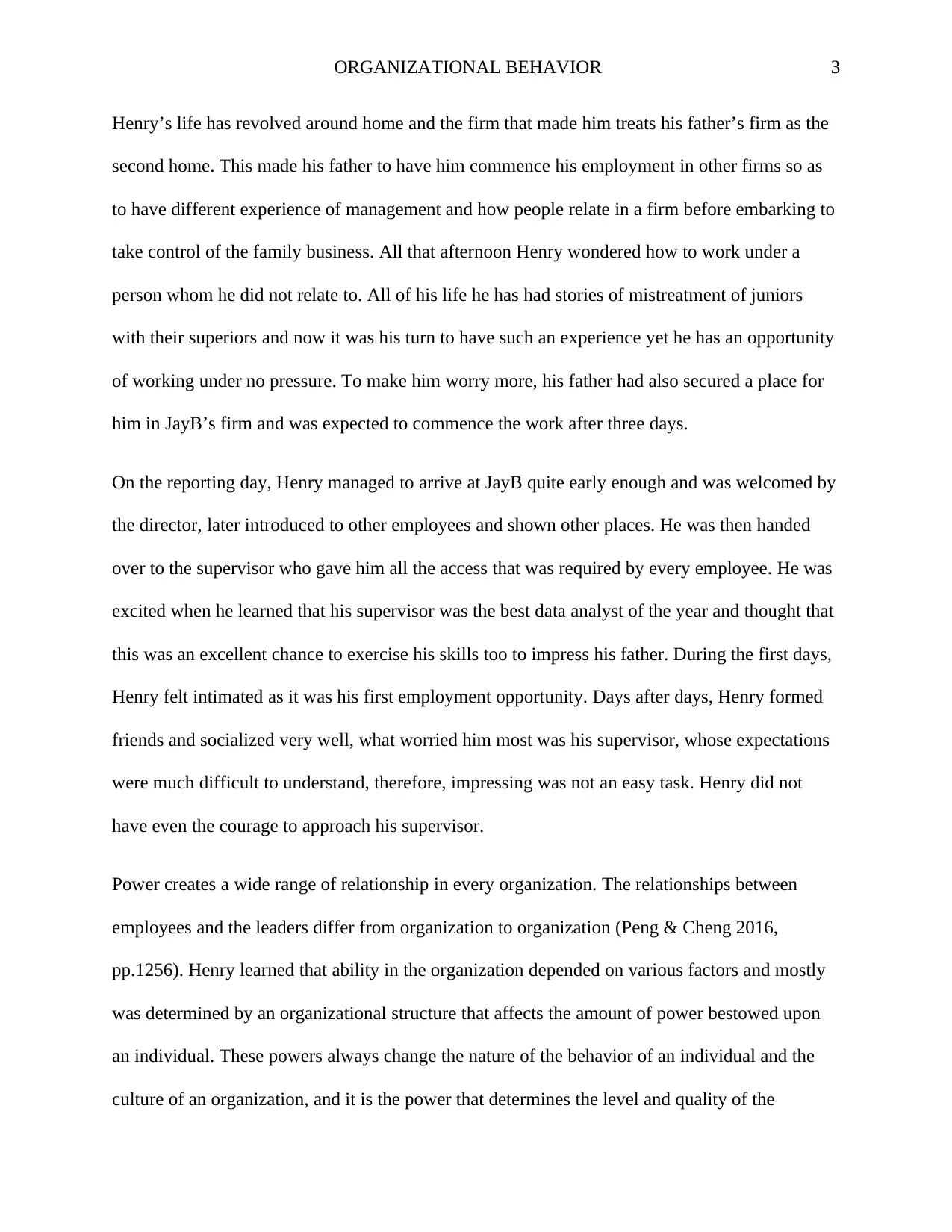
ORGANIZATIONAL BEHAVIOR 3
Henry’s life has revolved around home and the firm that made him treats his father’s firm as the
second home. This made his father to have him commence his employment in other firms so as
to have different experience of management and how people relate in a firm before embarking to
take control of the family business. All that afternoon Henry wondered how to work under a
person whom he did not relate to. All of his life he has had stories of mistreatment of juniors
with their superiors and now it was his turn to have such an experience yet he has an opportunity
of working under no pressure. To make him worry more, his father had also secured a place for
him in JayB’s firm and was expected to commence the work after three days.
On the reporting day, Henry managed to arrive at JayB quite early enough and was welcomed by
the director, later introduced to other employees and shown other places. He was then handed
over to the supervisor who gave him all the access that was required by every employee. He was
excited when he learned that his supervisor was the best data analyst of the year and thought that
this was an excellent chance to exercise his skills too to impress his father. During the first days,
Henry felt intimated as it was his first employment opportunity. Days after days, Henry formed
friends and socialized very well, what worried him most was his supervisor, whose expectations
were much difficult to understand, therefore, impressing was not an easy task. Henry did not
have even the courage to approach his supervisor.
Power creates a wide range of relationship in every organization. The relationships between
employees and the leaders differ from organization to organization (Peng & Cheng 2016,
pp.1256). Henry learned that ability in the organization depended on various factors and mostly
was determined by an organizational structure that affects the amount of power bestowed upon
an individual. These powers always change the nature of the behavior of an individual and the
culture of an organization, and it is the power that determines the level and quality of the
Henry’s life has revolved around home and the firm that made him treats his father’s firm as the
second home. This made his father to have him commence his employment in other firms so as
to have different experience of management and how people relate in a firm before embarking to
take control of the family business. All that afternoon Henry wondered how to work under a
person whom he did not relate to. All of his life he has had stories of mistreatment of juniors
with their superiors and now it was his turn to have such an experience yet he has an opportunity
of working under no pressure. To make him worry more, his father had also secured a place for
him in JayB’s firm and was expected to commence the work after three days.
On the reporting day, Henry managed to arrive at JayB quite early enough and was welcomed by
the director, later introduced to other employees and shown other places. He was then handed
over to the supervisor who gave him all the access that was required by every employee. He was
excited when he learned that his supervisor was the best data analyst of the year and thought that
this was an excellent chance to exercise his skills too to impress his father. During the first days,
Henry felt intimated as it was his first employment opportunity. Days after days, Henry formed
friends and socialized very well, what worried him most was his supervisor, whose expectations
were much difficult to understand, therefore, impressing was not an easy task. Henry did not
have even the courage to approach his supervisor.
Power creates a wide range of relationship in every organization. The relationships between
employees and the leaders differ from organization to organization (Peng & Cheng 2016,
pp.1256). Henry learned that ability in the organization depended on various factors and mostly
was determined by an organizational structure that affects the amount of power bestowed upon
an individual. These powers always change the nature of the behavior of an individual and the
culture of an organization, and it is the power that determines the level and quality of the
⊘ This is a preview!⊘
Do you want full access?
Subscribe today to unlock all pages.

Trusted by 1+ million students worldwide
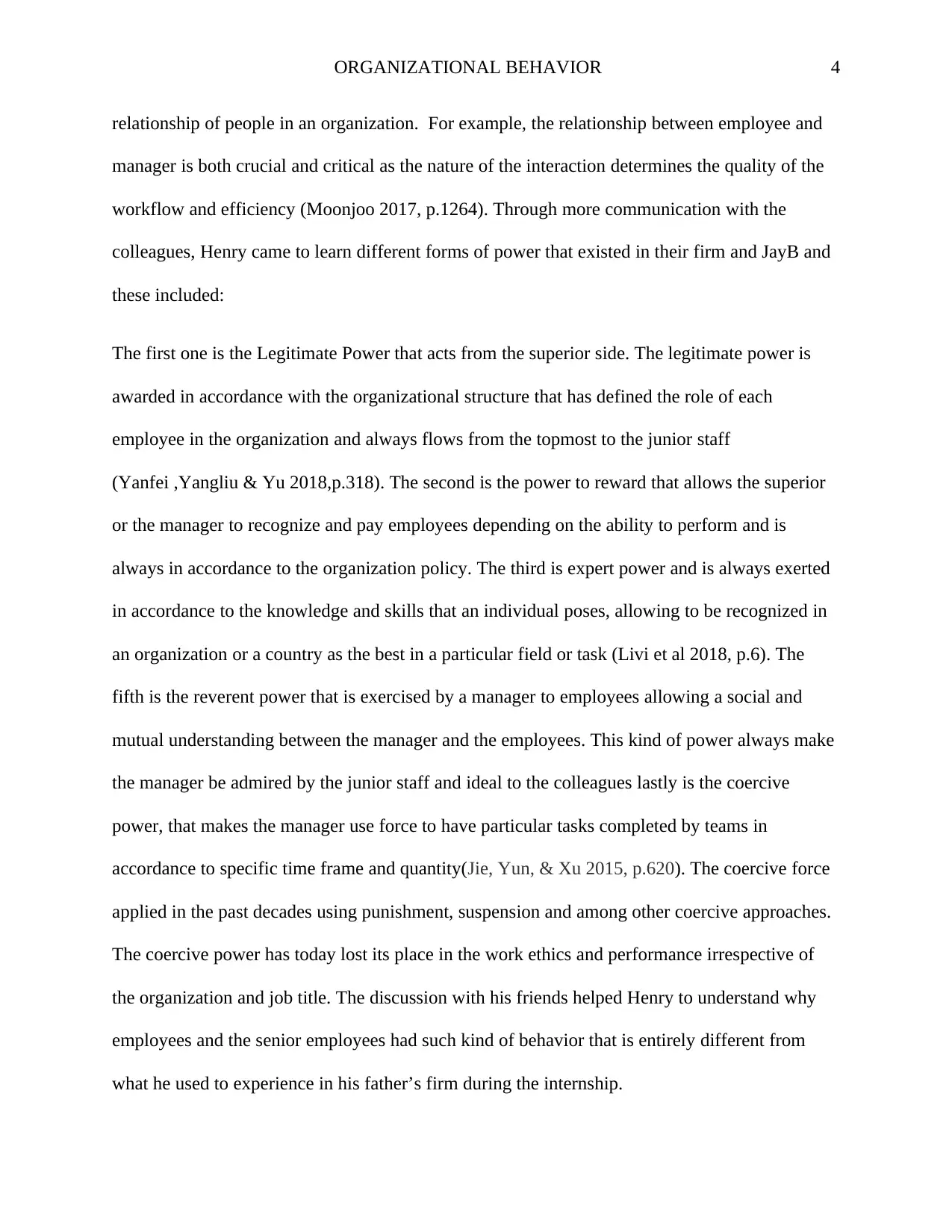
ORGANIZATIONAL BEHAVIOR 4
relationship of people in an organization. For example, the relationship between employee and
manager is both crucial and critical as the nature of the interaction determines the quality of the
workflow and efficiency (Moonjoo 2017, p.1264). Through more communication with the
colleagues, Henry came to learn different forms of power that existed in their firm and JayB and
these included:
The first one is the Legitimate Power that acts from the superior side. The legitimate power is
awarded in accordance with the organizational structure that has defined the role of each
employee in the organization and always flows from the topmost to the junior staff
(Yanfei ,Yangliu & Yu 2018,p.318). The second is the power to reward that allows the superior
or the manager to recognize and pay employees depending on the ability to perform and is
always in accordance to the organization policy. The third is expert power and is always exerted
in accordance to the knowledge and skills that an individual poses, allowing to be recognized in
an organization or a country as the best in a particular field or task (Livi et al 2018, p.6). The
fifth is the reverent power that is exercised by a manager to employees allowing a social and
mutual understanding between the manager and the employees. This kind of power always make
the manager be admired by the junior staff and ideal to the colleagues lastly is the coercive
power, that makes the manager use force to have particular tasks completed by teams in
accordance to specific time frame and quantity(Jie, Yun, & Xu 2015, p.620). The coercive force
applied in the past decades using punishment, suspension and among other coercive approaches.
The coercive power has today lost its place in the work ethics and performance irrespective of
the organization and job title. The discussion with his friends helped Henry to understand why
employees and the senior employees had such kind of behavior that is entirely different from
what he used to experience in his father’s firm during the internship.
relationship of people in an organization. For example, the relationship between employee and
manager is both crucial and critical as the nature of the interaction determines the quality of the
workflow and efficiency (Moonjoo 2017, p.1264). Through more communication with the
colleagues, Henry came to learn different forms of power that existed in their firm and JayB and
these included:
The first one is the Legitimate Power that acts from the superior side. The legitimate power is
awarded in accordance with the organizational structure that has defined the role of each
employee in the organization and always flows from the topmost to the junior staff
(Yanfei ,Yangliu & Yu 2018,p.318). The second is the power to reward that allows the superior
or the manager to recognize and pay employees depending on the ability to perform and is
always in accordance to the organization policy. The third is expert power and is always exerted
in accordance to the knowledge and skills that an individual poses, allowing to be recognized in
an organization or a country as the best in a particular field or task (Livi et al 2018, p.6). The
fifth is the reverent power that is exercised by a manager to employees allowing a social and
mutual understanding between the manager and the employees. This kind of power always make
the manager be admired by the junior staff and ideal to the colleagues lastly is the coercive
power, that makes the manager use force to have particular tasks completed by teams in
accordance to specific time frame and quantity(Jie, Yun, & Xu 2015, p.620). The coercive force
applied in the past decades using punishment, suspension and among other coercive approaches.
The coercive power has today lost its place in the work ethics and performance irrespective of
the organization and job title. The discussion with his friends helped Henry to understand why
employees and the senior employees had such kind of behavior that is entirely different from
what he used to experience in his father’s firm during the internship.
Paraphrase This Document
Need a fresh take? Get an instant paraphrase of this document with our AI Paraphraser
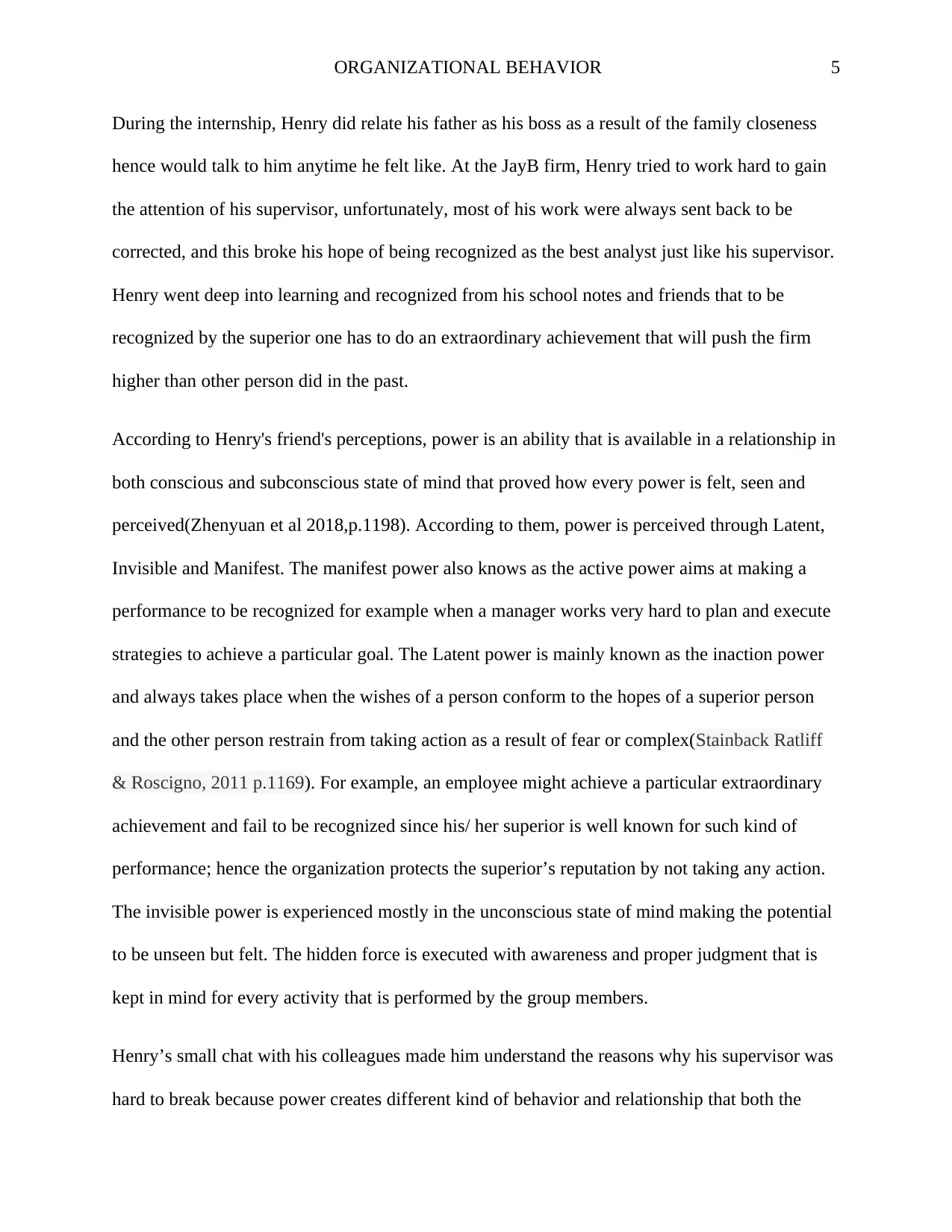
ORGANIZATIONAL BEHAVIOR 5
During the internship, Henry did relate his father as his boss as a result of the family closeness
hence would talk to him anytime he felt like. At the JayB firm, Henry tried to work hard to gain
the attention of his supervisor, unfortunately, most of his work were always sent back to be
corrected, and this broke his hope of being recognized as the best analyst just like his supervisor.
Henry went deep into learning and recognized from his school notes and friends that to be
recognized by the superior one has to do an extraordinary achievement that will push the firm
higher than other person did in the past.
According to Henry's friend's perceptions, power is an ability that is available in a relationship in
both conscious and subconscious state of mind that proved how every power is felt, seen and
perceived(Zhenyuan et al 2018,p.1198). According to them, power is perceived through Latent,
Invisible and Manifest. The manifest power also knows as the active power aims at making a
performance to be recognized for example when a manager works very hard to plan and execute
strategies to achieve a particular goal. The Latent power is mainly known as the inaction power
and always takes place when the wishes of a person conform to the hopes of a superior person
and the other person restrain from taking action as a result of fear or complex(Stainback Ratliff
& Roscigno, 2011 p.1169). For example, an employee might achieve a particular extraordinary
achievement and fail to be recognized since his/ her superior is well known for such kind of
performance; hence the organization protects the superior’s reputation by not taking any action.
The invisible power is experienced mostly in the unconscious state of mind making the potential
to be unseen but felt. The hidden force is executed with awareness and proper judgment that is
kept in mind for every activity that is performed by the group members.
Henry’s small chat with his colleagues made him understand the reasons why his supervisor was
hard to break because power creates different kind of behavior and relationship that both the
During the internship, Henry did relate his father as his boss as a result of the family closeness
hence would talk to him anytime he felt like. At the JayB firm, Henry tried to work hard to gain
the attention of his supervisor, unfortunately, most of his work were always sent back to be
corrected, and this broke his hope of being recognized as the best analyst just like his supervisor.
Henry went deep into learning and recognized from his school notes and friends that to be
recognized by the superior one has to do an extraordinary achievement that will push the firm
higher than other person did in the past.
According to Henry's friend's perceptions, power is an ability that is available in a relationship in
both conscious and subconscious state of mind that proved how every power is felt, seen and
perceived(Zhenyuan et al 2018,p.1198). According to them, power is perceived through Latent,
Invisible and Manifest. The manifest power also knows as the active power aims at making a
performance to be recognized for example when a manager works very hard to plan and execute
strategies to achieve a particular goal. The Latent power is mainly known as the inaction power
and always takes place when the wishes of a person conform to the hopes of a superior person
and the other person restrain from taking action as a result of fear or complex(Stainback Ratliff
& Roscigno, 2011 p.1169). For example, an employee might achieve a particular extraordinary
achievement and fail to be recognized since his/ her superior is well known for such kind of
performance; hence the organization protects the superior’s reputation by not taking any action.
The invisible power is experienced mostly in the unconscious state of mind making the potential
to be unseen but felt. The hidden force is executed with awareness and proper judgment that is
kept in mind for every activity that is performed by the group members.
Henry’s small chat with his colleagues made him understand the reasons why his supervisor was
hard to break because power creates different kind of behavior and relationship that both the
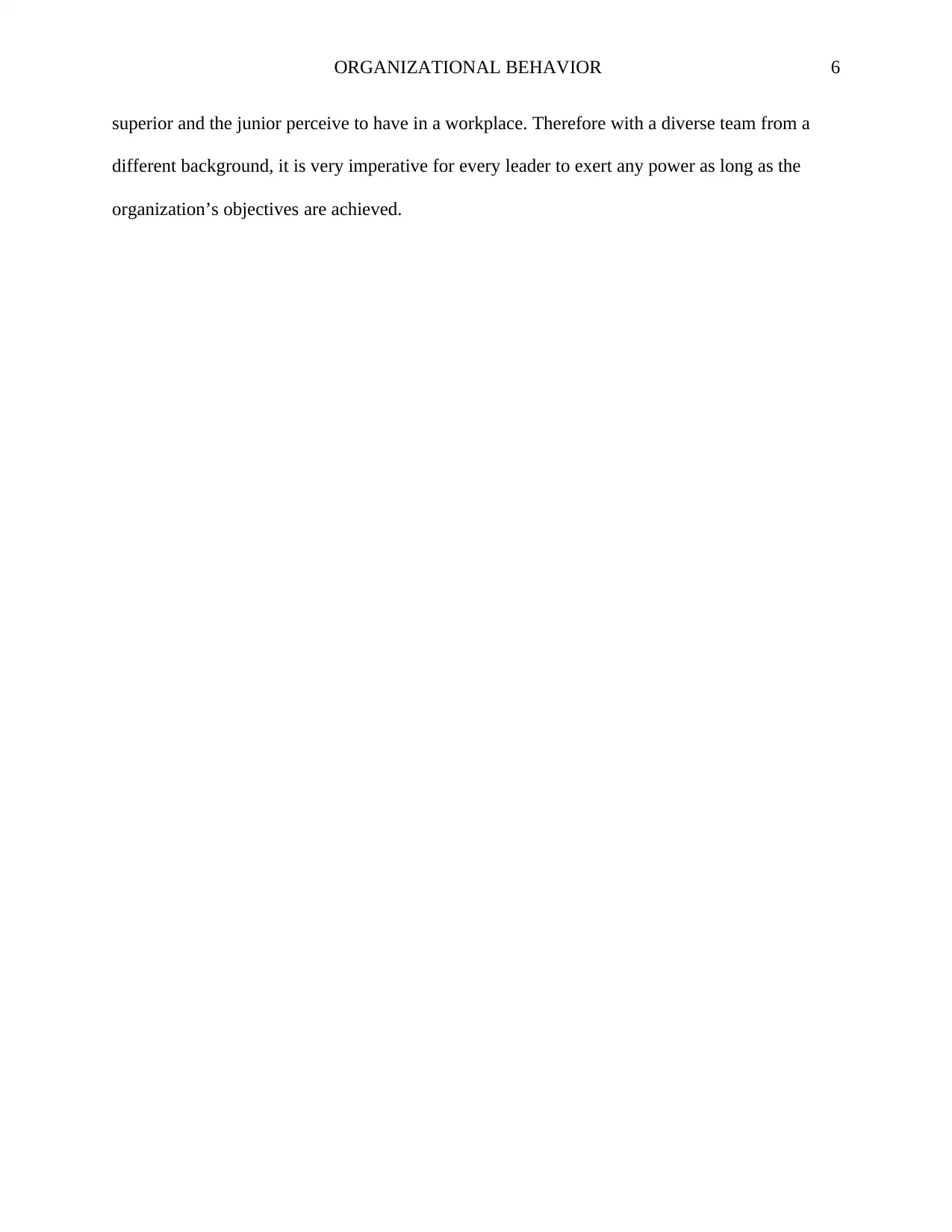
ORGANIZATIONAL BEHAVIOR 6
superior and the junior perceive to have in a workplace. Therefore with a diverse team from a
different background, it is very imperative for every leader to exert any power as long as the
organization’s objectives are achieved.
superior and the junior perceive to have in a workplace. Therefore with a diverse team from a
different background, it is very imperative for every leader to exert any power as long as the
organization’s objectives are achieved.
⊘ This is a preview!⊘
Do you want full access?
Subscribe today to unlock all pages.

Trusted by 1+ million students worldwide
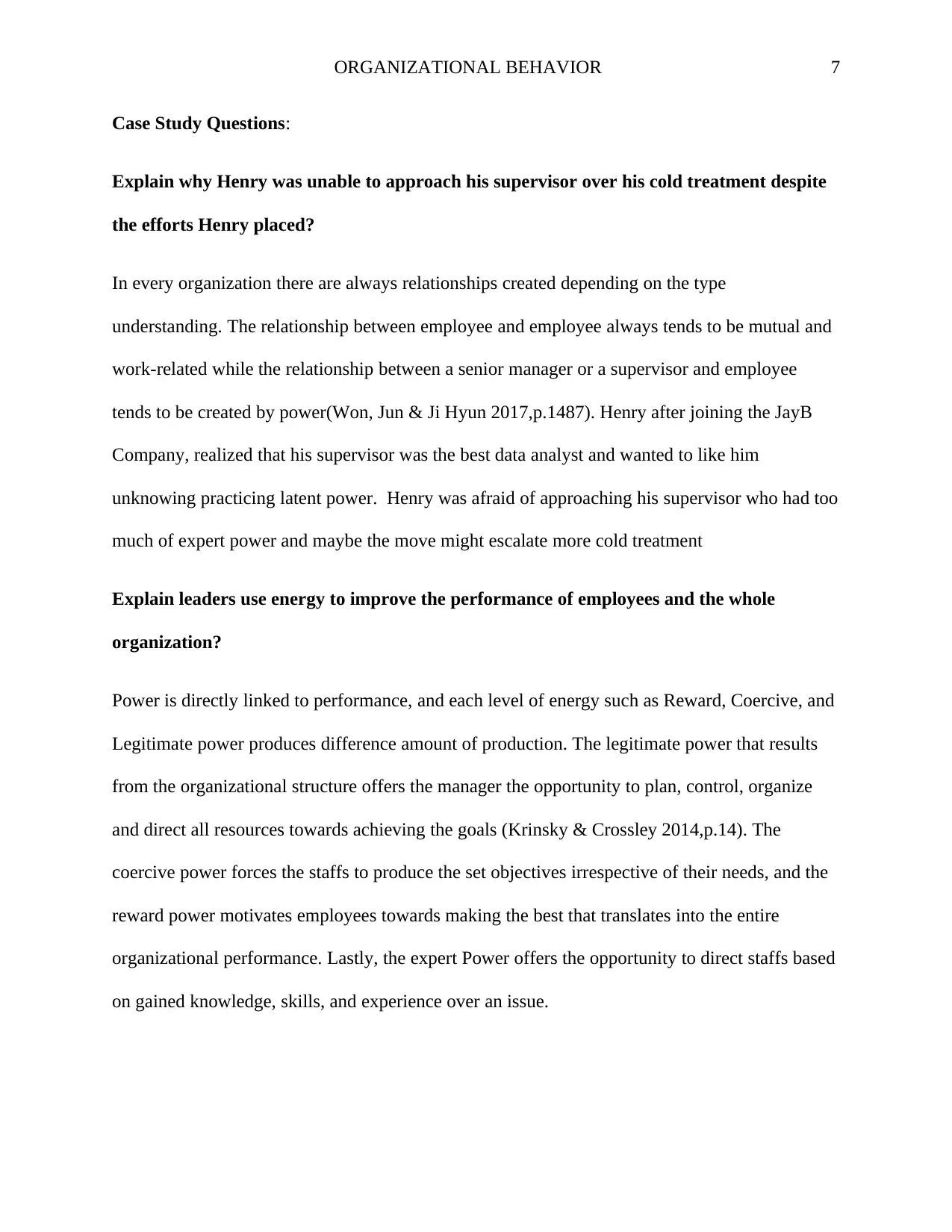
ORGANIZATIONAL BEHAVIOR 7
Case Study Questions:
Explain why Henry was unable to approach his supervisor over his cold treatment despite
the efforts Henry placed?
In every organization there are always relationships created depending on the type
understanding. The relationship between employee and employee always tends to be mutual and
work-related while the relationship between a senior manager or a supervisor and employee
tends to be created by power(Won, Jun & Ji Hyun 2017,p.1487). Henry after joining the JayB
Company, realized that his supervisor was the best data analyst and wanted to like him
unknowing practicing latent power. Henry was afraid of approaching his supervisor who had too
much of expert power and maybe the move might escalate more cold treatment
Explain leaders use energy to improve the performance of employees and the whole
organization?
Power is directly linked to performance, and each level of energy such as Reward, Coercive, and
Legitimate power produces difference amount of production. The legitimate power that results
from the organizational structure offers the manager the opportunity to plan, control, organize
and direct all resources towards achieving the goals (Krinsky & Crossley 2014,p.14). The
coercive power forces the staffs to produce the set objectives irrespective of their needs, and the
reward power motivates employees towards making the best that translates into the entire
organizational performance. Lastly, the expert Power offers the opportunity to direct staffs based
on gained knowledge, skills, and experience over an issue.
Case Study Questions:
Explain why Henry was unable to approach his supervisor over his cold treatment despite
the efforts Henry placed?
In every organization there are always relationships created depending on the type
understanding. The relationship between employee and employee always tends to be mutual and
work-related while the relationship between a senior manager or a supervisor and employee
tends to be created by power(Won, Jun & Ji Hyun 2017,p.1487). Henry after joining the JayB
Company, realized that his supervisor was the best data analyst and wanted to like him
unknowing practicing latent power. Henry was afraid of approaching his supervisor who had too
much of expert power and maybe the move might escalate more cold treatment
Explain leaders use energy to improve the performance of employees and the whole
organization?
Power is directly linked to performance, and each level of energy such as Reward, Coercive, and
Legitimate power produces difference amount of production. The legitimate power that results
from the organizational structure offers the manager the opportunity to plan, control, organize
and direct all resources towards achieving the goals (Krinsky & Crossley 2014,p.14). The
coercive power forces the staffs to produce the set objectives irrespective of their needs, and the
reward power motivates employees towards making the best that translates into the entire
organizational performance. Lastly, the expert Power offers the opportunity to direct staffs based
on gained knowledge, skills, and experience over an issue.
Paraphrase This Document
Need a fresh take? Get an instant paraphrase of this document with our AI Paraphraser
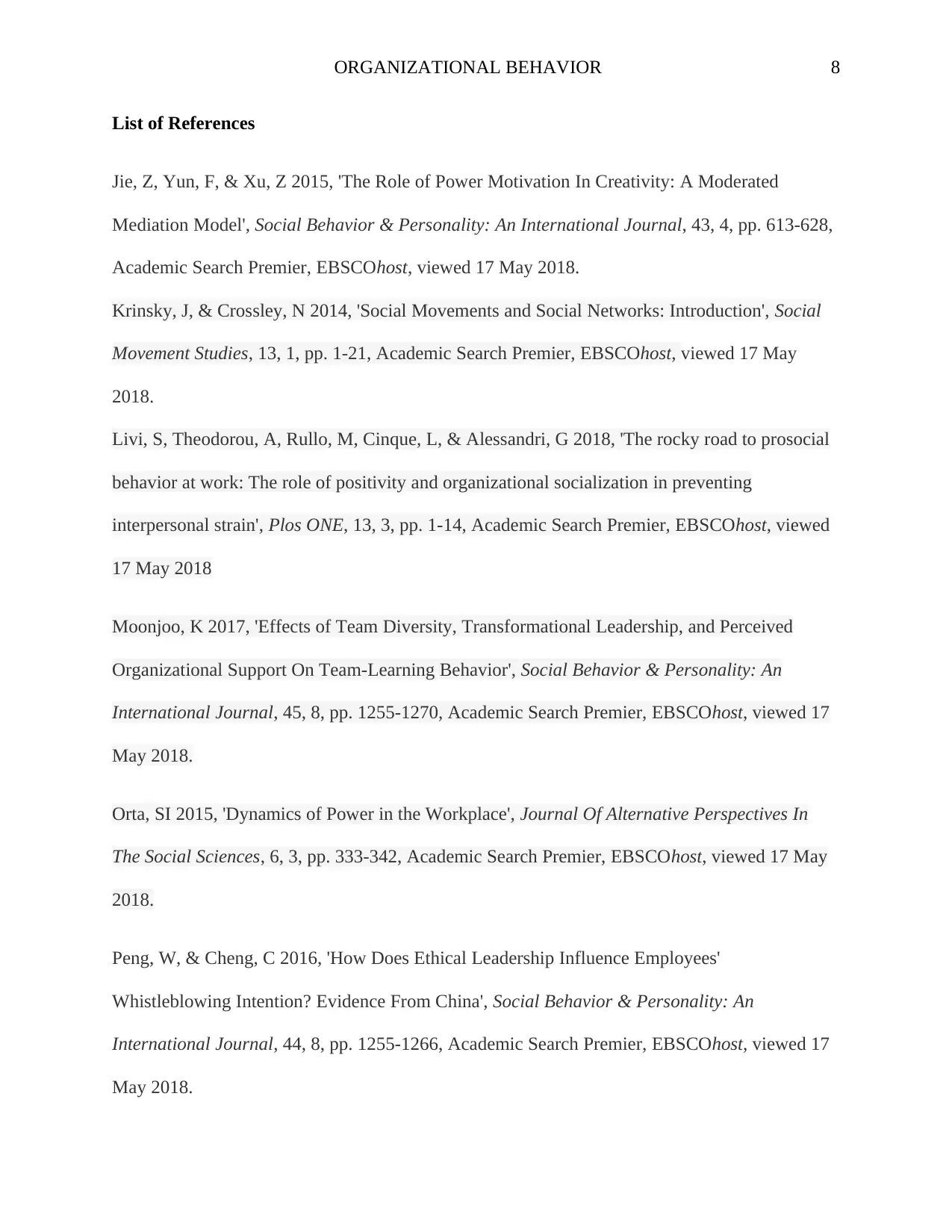
ORGANIZATIONAL BEHAVIOR 8
List of References
Jie, Z, Yun, F, & Xu, Z 2015, 'The Role of Power Motivation In Creativity: A Moderated
Mediation Model', Social Behavior & Personality: An International Journal, 43, 4, pp. 613-628,
Academic Search Premier, EBSCOhost, viewed 17 May 2018.
Krinsky, J, & Crossley, N 2014, 'Social Movements and Social Networks: Introduction', Social
Movement Studies, 13, 1, pp. 1-21, Academic Search Premier, EBSCOhost, viewed 17 May
2018.
Livi, S, Theodorou, A, Rullo, M, Cinque, L, & Alessandri, G 2018, 'The rocky road to prosocial
behavior at work: The role of positivity and organizational socialization in preventing
interpersonal strain', Plos ONE, 13, 3, pp. 1-14, Academic Search Premier, EBSCOhost, viewed
17 May 2018
Moonjoo, K 2017, 'Effects of Team Diversity, Transformational Leadership, and Perceived
Organizational Support On Team-Learning Behavior', Social Behavior & Personality: An
International Journal, 45, 8, pp. 1255-1270, Academic Search Premier, EBSCOhost, viewed 17
May 2018.
Orta, SI 2015, 'Dynamics of Power in the Workplace', Journal Of Alternative Perspectives In
The Social Sciences, 6, 3, pp. 333-342, Academic Search Premier, EBSCOhost, viewed 17 May
2018.
Peng, W, & Cheng, C 2016, 'How Does Ethical Leadership Influence Employees'
Whistleblowing Intention? Evidence From China', Social Behavior & Personality: An
International Journal, 44, 8, pp. 1255-1266, Academic Search Premier, EBSCOhost, viewed 17
May 2018.
List of References
Jie, Z, Yun, F, & Xu, Z 2015, 'The Role of Power Motivation In Creativity: A Moderated
Mediation Model', Social Behavior & Personality: An International Journal, 43, 4, pp. 613-628,
Academic Search Premier, EBSCOhost, viewed 17 May 2018.
Krinsky, J, & Crossley, N 2014, 'Social Movements and Social Networks: Introduction', Social
Movement Studies, 13, 1, pp. 1-21, Academic Search Premier, EBSCOhost, viewed 17 May
2018.
Livi, S, Theodorou, A, Rullo, M, Cinque, L, & Alessandri, G 2018, 'The rocky road to prosocial
behavior at work: The role of positivity and organizational socialization in preventing
interpersonal strain', Plos ONE, 13, 3, pp. 1-14, Academic Search Premier, EBSCOhost, viewed
17 May 2018
Moonjoo, K 2017, 'Effects of Team Diversity, Transformational Leadership, and Perceived
Organizational Support On Team-Learning Behavior', Social Behavior & Personality: An
International Journal, 45, 8, pp. 1255-1270, Academic Search Premier, EBSCOhost, viewed 17
May 2018.
Orta, SI 2015, 'Dynamics of Power in the Workplace', Journal Of Alternative Perspectives In
The Social Sciences, 6, 3, pp. 333-342, Academic Search Premier, EBSCOhost, viewed 17 May
2018.
Peng, W, & Cheng, C 2016, 'How Does Ethical Leadership Influence Employees'
Whistleblowing Intention? Evidence From China', Social Behavior & Personality: An
International Journal, 44, 8, pp. 1255-1266, Academic Search Premier, EBSCOhost, viewed 17
May 2018.
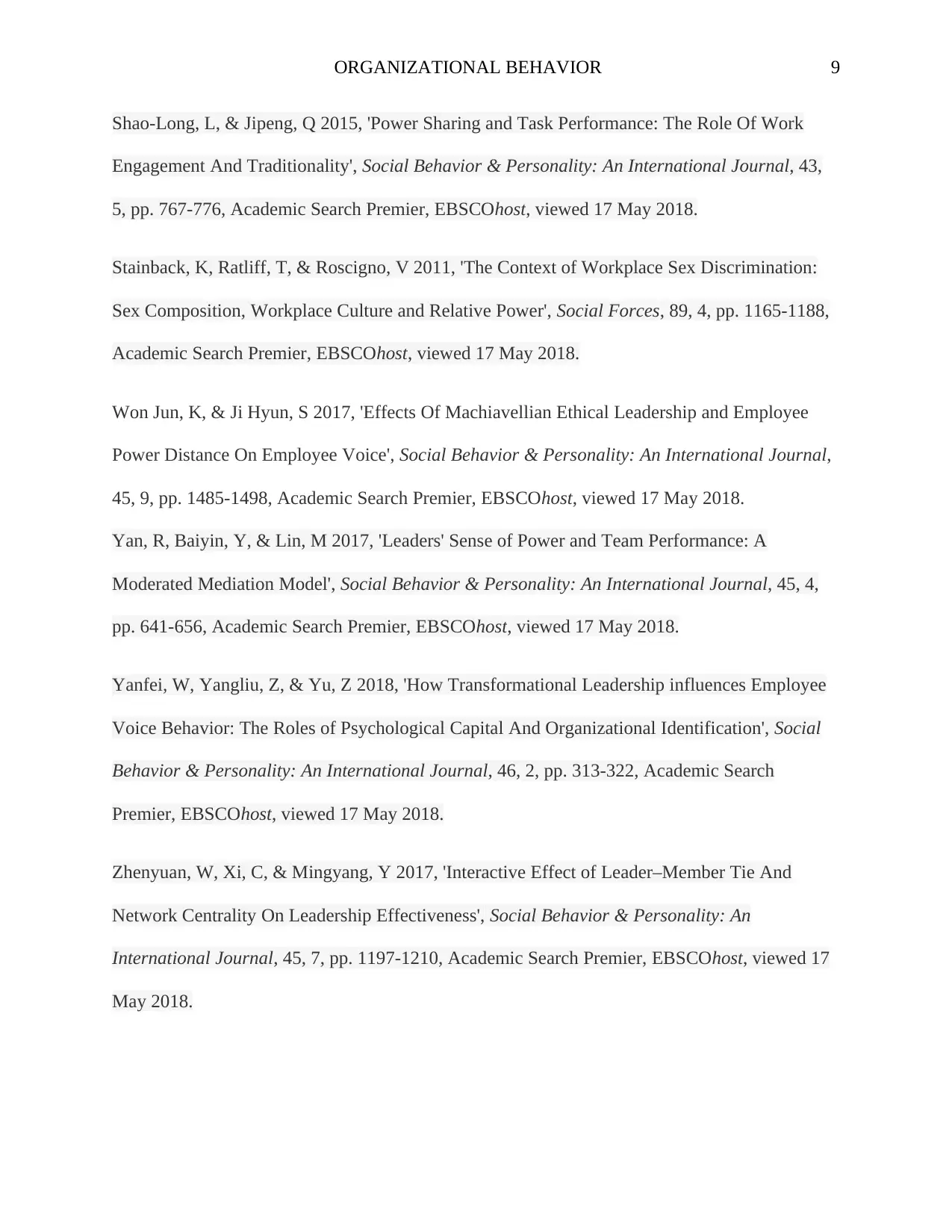
ORGANIZATIONAL BEHAVIOR 9
Shao-Long, L, & Jipeng, Q 2015, 'Power Sharing and Task Performance: The Role Of Work
Engagement And Traditionality', Social Behavior & Personality: An International Journal, 43,
5, pp. 767-776, Academic Search Premier, EBSCOhost, viewed 17 May 2018.
Stainback, K, Ratliff, T, & Roscigno, V 2011, 'The Context of Workplace Sex Discrimination:
Sex Composition, Workplace Culture and Relative Power', Social Forces, 89, 4, pp. 1165-1188,
Academic Search Premier, EBSCOhost, viewed 17 May 2018.
Won Jun, K, & Ji Hyun, S 2017, 'Effects Of Machiavellian Ethical Leadership and Employee
Power Distance On Employee Voice', Social Behavior & Personality: An International Journal,
45, 9, pp. 1485-1498, Academic Search Premier, EBSCOhost, viewed 17 May 2018.
Yan, R, Baiyin, Y, & Lin, M 2017, 'Leaders' Sense of Power and Team Performance: A
Moderated Mediation Model', Social Behavior & Personality: An International Journal, 45, 4,
pp. 641-656, Academic Search Premier, EBSCOhost, viewed 17 May 2018.
Yanfei, W, Yangliu, Z, & Yu, Z 2018, 'How Transformational Leadership influences Employee
Voice Behavior: The Roles of Psychological Capital And Organizational Identification', Social
Behavior & Personality: An International Journal, 46, 2, pp. 313-322, Academic Search
Premier, EBSCOhost, viewed 17 May 2018.
Zhenyuan, W, Xi, C, & Mingyang, Y 2017, 'Interactive Effect of Leader–Member Tie And
Network Centrality On Leadership Effectiveness', Social Behavior & Personality: An
International Journal, 45, 7, pp. 1197-1210, Academic Search Premier, EBSCOhost, viewed 17
May 2018.
Shao-Long, L, & Jipeng, Q 2015, 'Power Sharing and Task Performance: The Role Of Work
Engagement And Traditionality', Social Behavior & Personality: An International Journal, 43,
5, pp. 767-776, Academic Search Premier, EBSCOhost, viewed 17 May 2018.
Stainback, K, Ratliff, T, & Roscigno, V 2011, 'The Context of Workplace Sex Discrimination:
Sex Composition, Workplace Culture and Relative Power', Social Forces, 89, 4, pp. 1165-1188,
Academic Search Premier, EBSCOhost, viewed 17 May 2018.
Won Jun, K, & Ji Hyun, S 2017, 'Effects Of Machiavellian Ethical Leadership and Employee
Power Distance On Employee Voice', Social Behavior & Personality: An International Journal,
45, 9, pp. 1485-1498, Academic Search Premier, EBSCOhost, viewed 17 May 2018.
Yan, R, Baiyin, Y, & Lin, M 2017, 'Leaders' Sense of Power and Team Performance: A
Moderated Mediation Model', Social Behavior & Personality: An International Journal, 45, 4,
pp. 641-656, Academic Search Premier, EBSCOhost, viewed 17 May 2018.
Yanfei, W, Yangliu, Z, & Yu, Z 2018, 'How Transformational Leadership influences Employee
Voice Behavior: The Roles of Psychological Capital And Organizational Identification', Social
Behavior & Personality: An International Journal, 46, 2, pp. 313-322, Academic Search
Premier, EBSCOhost, viewed 17 May 2018.
Zhenyuan, W, Xi, C, & Mingyang, Y 2017, 'Interactive Effect of Leader–Member Tie And
Network Centrality On Leadership Effectiveness', Social Behavior & Personality: An
International Journal, 45, 7, pp. 1197-1210, Academic Search Premier, EBSCOhost, viewed 17
May 2018.
⊘ This is a preview!⊘
Do you want full access?
Subscribe today to unlock all pages.

Trusted by 1+ million students worldwide
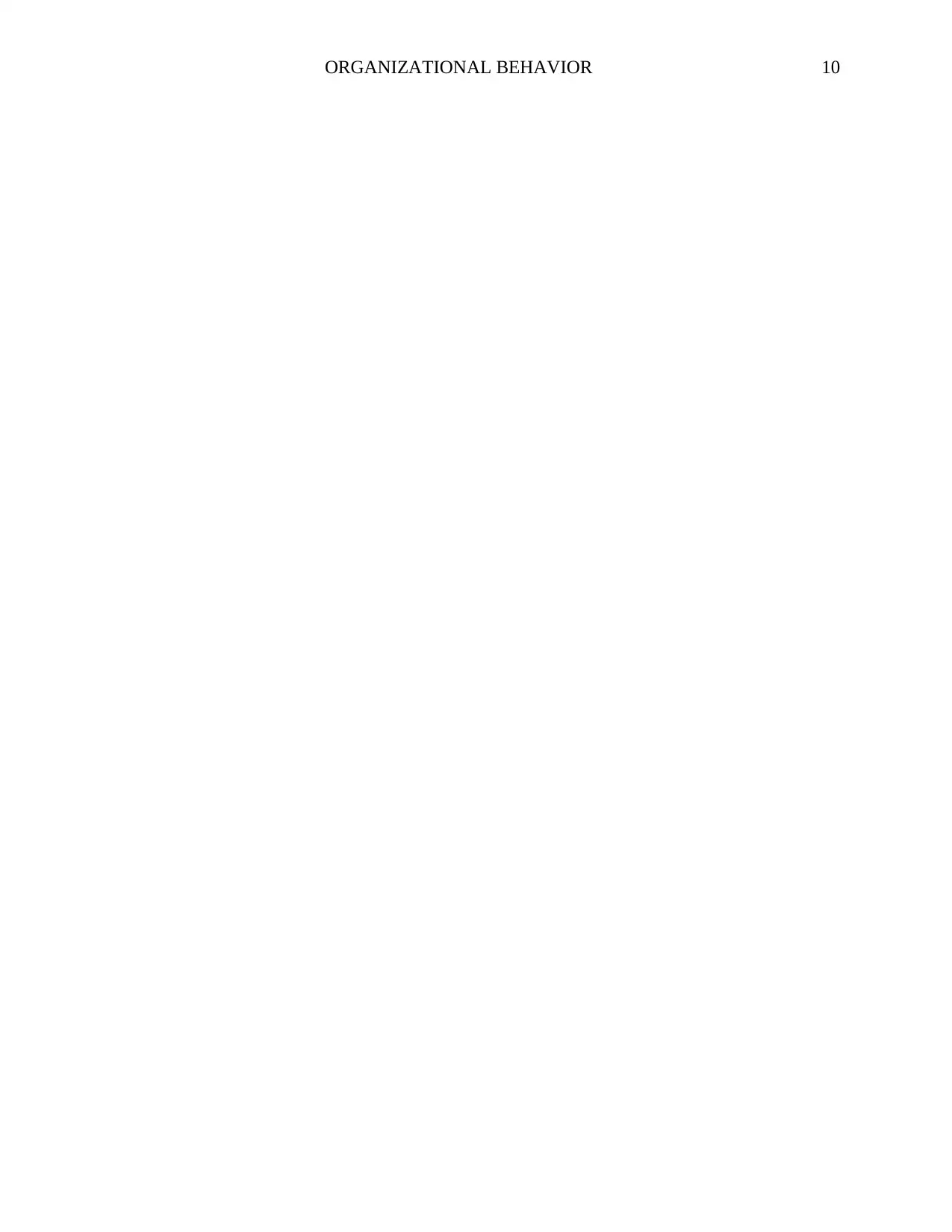
ORGANIZATIONAL BEHAVIOR 10
1 out of 10
Related Documents
Your All-in-One AI-Powered Toolkit for Academic Success.
+13062052269
info@desklib.com
Available 24*7 on WhatsApp / Email
![[object Object]](/_next/static/media/star-bottom.7253800d.svg)
Unlock your academic potential
Copyright © 2020–2026 A2Z Services. All Rights Reserved. Developed and managed by ZUCOL.





